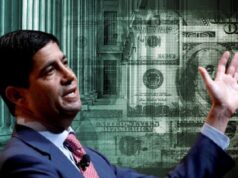The nomination of Scott Bessent as Treasury Secretary by President-elect Donald Trump has ignited debate among financial experts, policymakers, and cryptocurrency enthusiasts alike. As a seasoned hedge fund manager with a clear pro-crypto stance, Bessent brings both opportunities and challenges to the table. His appointment marks a pivotal moment for the intersection of traditional finance and emerging blockchain technology. This dynamic could reshape the U.S. economic landscape. Yet, as the nation grapples with soaring debt and fiscal constraints, the question remains: Can Bessent balance innovation with responsibility?
A Pro-Crypto Vision: Opportunity for Blockchain and Beyond
Bessent’s reputation as a forward-thinking financier stems from his advocacy for cryptocurrencies and blockchain technology. His nomination is widely regarded as a positive signal for the digital asset industry. Many anticipate regulatory clarity and innovation-friendly policies. Under his stewardship, the Treasury Department could push for frameworks that foster growth in decentralized finance (DeFi), digital payments, and blockchain applications, positioning the U.S. as a leader in the global crypto economy.
His experience managing large-scale investments, including his tenure with Soros Fund Management, suggests he understands the intricacies of market dynamics. Industry insiders see Bessent’s pro-crypto stance as a step toward bridging the gap between traditional banking systems and blockchain-driven financial models.
Fiscal Challenges: A Daunting Landscape
However, concerns over the nation’s fiscal health temper the optimism surrounding his nomination. The U.S. is navigating unprecedented levels of debt, with projections showing trillions in annual deficits in the coming years. Critics argue that while blockchain and cryptocurrencies hold transformative potential, they are not a panacea for systemic economic issues.
Economist Peter Schiff, a vocal critic of cryptocurrencies, has warned that Bessent’s focus on innovation may be overshadowed by the practical demands of managing mounting debt. The Treasury Secretary’s role in securing buyers for government debt and maintaining the dollar’s status as the world’s reserve currency will require a delicate balance. Geopolitical tensions and fluctuating market confidence complicate this task significantly.
Public Opinion: A Nation Divided
The reaction to Bessent’s nomination underscores a divide in public opinion. Cryptocurrency advocates hail his appointment as a progressive move. They argue it signals the administration’s openness to embracing digital assets as part of a modern economic strategy. Supporters believe Bessent’s leadership could reduce regulatory bottlenecks and create a more inclusive financial system.
Conversely, fiscal conservatives express skepticism. They highlight the risks of prioritizing crypto-friendly policies in an era of budgetary constraints. Could innovation come at the expense of fiscal discipline? They question whether Scott Bessent can address longstanding issues, such as tax reform and government spending while advancing his vision for digital finance.
Balancing Act: A Test of Leadership
Bessent’s tenure, if confirmed, will undoubtedly be a balancing act. On one hand, he has the opportunity to champion cryptocurrency and blockchain technologies, fostering innovation and competitiveness. On the other, he must confront the realities of fiscal policy, ensuring that short-term gains do not undermine long-term stability.
His success will hinge on his ability to reconcile these competing priorities, all while navigating a politically charged environment. Whether he can rise to the occasion remains to be seen. However, his nomination has already set the stage for one of the most consequential debates in modern financial history.
As the world watches, Scott Bessent’s stewardship of the Treasury will not only define his legacy but could also shape the trajectory of the U.S. economy for years to come.
Readers’ frequently asked questions
What role does the Treasury Secretary play in cryptocurrency regulation?
The U.S. Treasury Secretary has significant influence over the regulation of cryptocurrencies through their oversight of agencies like the Internal Revenue Service (IRS) and the Financial Crimes Enforcement Network (FinCEN). The Secretary helps shape policies on taxation, anti-money laundering (AML) measures, and financial stability related to digital assets. They also collaborate with Congress and other agencies to set the direction for how cryptocurrencies fit into the broader financial system. This includes determining whether cryptocurrencies are classified as assets, currencies, or securities, which impacts their use and taxation.
What challenges does the U.S. debt present for cryptocurrency adoption?
The growing U.S. debt creates a complex environment for integrating cryptocurrencies into the financial system. High debt levels may require the Treasury to focus on attracting buyers for government securities and stabilizing the dollar as the world’s reserve currency. Introducing or prioritizing new cryptocurrency policies during this fiscal strain could face pushback if seen as a distraction from addressing the debt. Additionally, large-scale adoption of digital currencies might be limited if they are perceived as competing with traditional financial mechanisms critical to debt financing.
How does blockchain technology relate to government fiscal policies?
Blockchain technology can provide transparency and efficiency in fiscal policies by enabling secure, traceable transactions. Governments could use blockchain to improve tax collection, reduce fraud, and streamline welfare payments. However, its integration into fiscal systems is still in experimental stages and largely depends on supportive regulations and technological readiness. As Treasury Secretary, Bessent’s role would include evaluating how such technologies could fit into or improve current fiscal operations without disrupting existing systems.
What Is In It For You? Action Items You Might Want to Consider
Stay Alert for Policy Announcements
With Scott Bessent’s pro-crypto stance, the Treasury could introduce regulations or guidelines directly impacting how cryptocurrencies are traded, taxed, or held. Keep an eye on updates from the U.S. Treasury and related regulatory agencies like the SEC or IRS. These announcements might clarify tax reporting, security classifications, or DeFi operations – critical information for making informed trading decisions.
Diversify Your Portfolio in Anticipation of Market Shifts
Bessent’s potential policies could influence market sentiment, particularly for U.S.-based crypto assets and blockchain projects. Consider diversifying into established cryptocurrencies, such as Bitcoin and Ethereum, while exploring regulated U.S.-based stablecoins or tokens tied to blockchain projects that could benefit from a favorable regulatory environment. This strategy may help you stay resilient to market volatility driven by policy shifts.
Prepare for Changes in Tax Reporting Requirements
Given Bessent’s probable focus on clearer crypto regulations, changes to tax reporting requirements are likely. Start organizing your trading records now, ensuring all transactions are accurately documented. Using tax software tailored to cryptocurrency or consulting with a crypto-savvy tax professional can save you headaches later. Being prepared will put you ahead of the curve if new rules or deadlines are introduced.











[…] >>> Scott Bessent – Crypto Advocate Nominated for Treasury Secretary […]
[…] >>> Read more: Scott Bessent – Crypto Advocate Nominated for Treasury Secretary […]